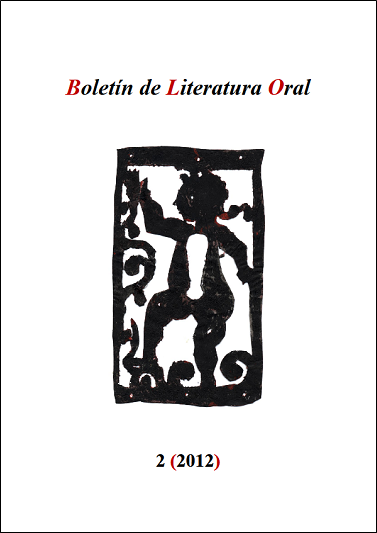El retorno del marido en el romancero y en las tragoúdia tradicionales griegas / The husband’s return in the Spanish Romances and the Greek tragoúdia
Palabras clave:
KEYWORDS, the husband’s return, ο γυρισμός του ξενιτεμένου, Spanish ballad, παραλογές, tragoúdia, oral poetry, Greek traditional tragoúdia / PALABRAS-CLAVE, retorno del marido, romances, baladas griegasResumen
ABSTRACT. The present paper compares the topic of the husband’s return in two manifestations of the European ballad tradition: the Spanish romances and the Greek tragoúdia. After an introduction outlining the characteristics of both genres, the author presents the structure of the two poems that were on the basis of his investigation. In addition, the author provides a detailed analysis of this topic in several versions of the poems. He concludes that, besides the similarities and analogies, there is one aspect that differentiates the two traditions: in romances, the clues that the wife gives to his husband to be recognized are focused, whilst in the Greek ballads, the wife is not convinced by her husband when he reveals his identity, and then she asks for more proofs to be sure. According to the hypotheses put forward in the present paper, the relevance given to this aspect in the Greek ballad is due to the influence of the Odyssey.
RESUMEN. Este trabajo compara el motivo del retorno del marido en dos manifestaciones de la baladística europea, los romances novelescos españoles y las tragoúdia tradicionales griegas. Tras esbozar una introducción a los géneros, el autor presenta la estructura de dos poemas que sirvieron como base de la investigación. Seguidamente, se lleva a cabo un análisis detallado, a partir de un buen número de versiones. Según se concluye, además de las semejanzas y analogías, hay un aspecto que diferencia las dos tradiciones: en los romances, se hace énfasis en las pistas que da la mujer a su marido, quien acaba persuadiéndola; en las baladas griegas, la mujer no está convencida cuando su marido revela su identidad, de modo que le somete a una serie de pruebas antes de convencerse. Según la hipótesis defendida, la importancia dada a este aspecto se debe a una mayor influencia de la Odisea en la balada griega.
Descargas
Citas
ALVAR, Manuel (1987): Romancero viejo y tradicional, 3a ed., en la Coll. Sepan Cuantos, n. 174, México, Porrúa [1.a ed, 1971].
AYENSA PRAT, Eusebi (2000): Baladas griegas. Estudio formal temático y comparativo, en Nueva Roma, n. 10, Madrid, CSIC.
— (2004): Cancionero griego de frontera, en Nueva Roma, n. 23, Madrid, CSIC.
BOIX JOVANÍ, Alfonso e Ioannis KIORIDIS: «¿Amigo o enemigo? Cristianos y musulmanes en el romancero español y las baladas tradicionales griegas», Estudos de Literatura Oral [en prensa].
CASTILLO DIDIER, Miguel (1994): Poesía heroica griega: Epopeya de Diyenís Akritas, Cantares de Armuris y de Andrónico, Santiago, Universidad de Chile.
DÍAZ-MAS, Paloma (ed.) (2006): Romancero, Barcelona, Crítica (Clásicos y Modernos, 9).
ΕΥΛΑΜΠΙΟΣ, Γεώργιος (1973): Ο Αμάραντος ήτοι ρόδα της αναγεννηθείσης Ελλάδος [reimpr. por Νότης Καραβίας de la 1.a ed, Petrópolis, 1843].
ΘΕΡΟΣ, Άγις (1951): Τα τραγούδια των Ελλήνων, τόμος Α’, Αθήνα, Αετός. — (1952): Τα τραγούδια των Ελλήνων, τόμος Β’, Αθήνα, Αετός.
FAURIEL, Claude (1956): Δημοτικά Τραγούδια της Συγχρόνου Ελλάδος, intr. de Νίκος Βέης, trad. de Α. Χατζηεμμανουήλ, Αθήνα, Τεγόπουλος-Νίκας.
JEANNARAKI, Anton (1876): Άσματα Κρητικά μετά διστίχων και παροιμιών, Leipzig.
ΚΑΣΙΜΑΤΗΣ, Κ. Π. (1911): «Λαογραφικά σύλλεκτα εξ Ίου», Λαογραφία 2, pp. 591-637.
ΚΑΨΑΛΗΣ, Γ. (1917): «Λαογραφικά εκ Μακεδονίας», Λαογραφία 6, pp. 452–537.
LAGARDE, Paul de (1886): Neugriechisches aus Kleinasien, Göttingen.
PASSOW, A. (1958): Δημοτικά Τραγούδια, Αθήνα, Νίκας-Σπανός [Título original: Τραγούδια Ρωμαίικα, Popularia Carmina Graeciae recentioris, Lipsiae, Teubner, 1860].
ΠΟΛΙΤΗΣ, Νικόλαος (1975): Εκλογαί από τα τραγούδια του ελληνικού λαού, Αθήναι, Διόνυσος.
POLITIS, Nikolaos (2001): Canciones populares neogriegas, trad, intr y notas por Román Bermejo López-Muñiz, Valladolid, Secretariado de Publicaciones e Intercambio Editorial, Universidad de Valladolid [Título original: Εκλογαί από τα τραγούδια του ελληνικού λαού].
— (2006): Canciones del pueblo griego. Selección, trad. de Aurora Golderos Fernández y Francisco Martín García, en la Coll. Monografías, n. 46, Cuenca, Ediciones de la Universidad de Castilla-La Mancha, UCLM.
ΡΩΜΑΙΟΣ, Κώστας (1979): Δημοτικό Τραγούδι. Προβλήματα καταγωγής και τεχνοτροπίας, τόμος πρώτος, Αθήνα.
SAUNIER, Guy (cuid.) (1983): Το δημοτικό τραγούδι της ξενιτιάς, Αθήνα, Ερμής. ΣΚΑΡΤΣΗΣ, Σωκράτης (1987): Δημοτικά Τραγούδια-Ανθολογία, Αθήνα, Καστανιώτης. ΣΛΙΝΗΣ, Μιχαήλ (1929-1932): «Σύμμεικτα. Άσματα Μακεδονικά», Λαογραφία, 10, pp. 257-261.
SPLETTSTÖSER, Willy (1898): «Der heimkehrende Gatte und sein Weib in der Weltliteratur», Philosophische Dissertationen [Berlin].
Descargas
Publicado
Cómo citar
Número
Sección
Licencia
Los autores que publican en esta revista están de acuerdo con los siguientes términos:
- Los autores conservan los derechos de autor y garantizan a la revista el derecho de ser la primera publicación del trabajo al igual que licenciado bajo una Creative Commons Attribution License que permite a otros compartir el trabajo con un reconocimiento de la autoría del trabajo y la publicación inicial en esta revista.
- Los autores pueden establecer por separado acuerdos adicionales para la distribución no exclusiva de la versión de la obra publicada en la revista (por ejemplo, situarlo en un repositorio institucional o publicarlo en un libro), con un reconocimiento de su publicación inicial en esta revista.
- Se permite y se anima a los autores a difundir sus trabajos electrónicamente (por ejemplo, en repositorios institucionales o en su propio sitio web) antes y durante el proceso de envío, ya que puede dar lugar a intercambios productivos, así como a una citación más temprana y mayor de los trabajos publicados (Véase The Effect of Open Access) (en inglés).























